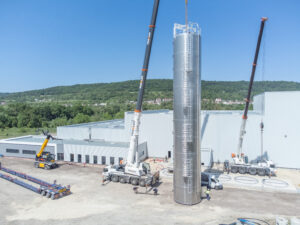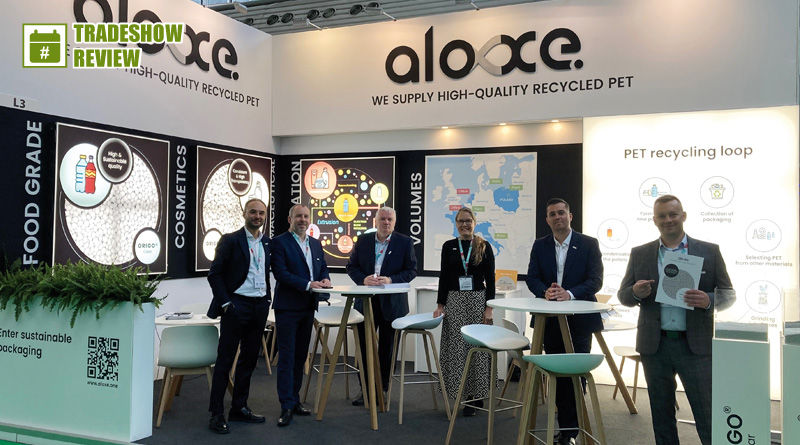Support an organised value chain of rPET
Recycled PET is and will be an increasingly sought-after material. Due to EU directives and the obligation of numerous packaging manufacturers to use a high proportion of rPET in their products, but with less demand at the moment, the rPET market is becoming increasingly stressed. Numerous circular economy initiatives, recycling-friendly product design, certificates that guarantee the origin and quality of rPET are important individual building blocks for shaping the rPET market. At the PRSE 2023 in Amsterdam all hot topics of the plastics recycling industry were discussed.
in for rPET in Europe (or worldwide). The producer of high quality recycled material company Aloxe was founded in 2020 by Arnaud Piroëlle and Clément Lefebvre, two well-known experts in the PET and chemical industry. PETplanet spoke to Aloxe about the current rPET market situation, the company’s growth strategy and the challenges of establishing an rPET value chain.
PETplanet: What was the trigger for founding Aloxe? What reasons were important for you and what is your goal?
Aloxe: The two founders, Arnaud Piroëlle and Clément Lefebvre drawing on their experience at leading companies in the sector (BASF, Veolia) and in entrepreneurship decided to found Aloxe to address a the fast-growing sustainable packaging market in Europe. They identified a strong demand in the food-contact rPET market, with customers looking for standardised high volumes and demanding quality in the face of a market that was still fragmented and offering inconsistent quality; the project started from this observation, to establish a leader who could guarantee large volumes with high and consistent quality.

PETplanet: You currently produce in three countries: in Italy, France and (two factories) in Poland. How much rPET do you produce pre year and what equipment do you use?
Aloxe: In 2024, Aloxe will have a 120,000 t rPET pellets output capacity in Europe. We run state-of-the-art recycling lines like Erema and Starlinger in brand new plants, allowing optimum industrialised processes.
Our core business is high quality and food contact rPET pellets to supply the beverages, food containers, cosmetics, pharmaceutical, and home & personal care packaging industry. We supply standardised products with good processability for our customers.
PETplanet: What kind of flakes and pellets do you produce? Where do you see more demand – from the packaging- or from the textile/technical industry?
Aloxe: We mainly supply the food-grade packaging industry and foster circular economy such as bottle to bottle.
Demand is driven by European regulations and some local taxes on the incorporation of recycled plastics, and also by companies’ commitments to the plastics circular economy, hence reducing their carbon footprint.
We supply different markets: CSD bottle with Orgop clear P rPET pellets with high IV, non-CSD bottle, trays and food containers with Orgio clear rPET pellets, cosmetics and pharmaceutical containers with Orgio Crystal rPET pellets meeting the high transparency requirements, and milk bottle with Orgio Olive. We produce flakes for our own pelletising lines and also offer food grade flakes (Efsa approved) to meet customers’ needs.
PETplanet: Where do you buy your bales, your material from? Are there reliable partners? What is your approach to be able to process enough material?
Aloxe: At Aloxe, we buy bales and flakes; we are partially integrated to guarantee a secured and steady supply. To achieve this, we benefit from a wide network and long-standing partnerships built over time; our feedstock is secured to meet our customers’ requirements in terms of quality and origins.
PETplanet: What do you find useful about the EU directives and what could be improved? Do they strengthen the European rPET market?
Aloxe: Establishing concrete recycled target contents for bottles in the EU has boosted the recycling industry! Today, as the industry moves to meet these targets in Europe, the rPET value chain has become a showcase not only in Europe but worldwide and proves that the plastics circular economy is on the move. We still face many challenges, of course, but the momentum is there. Being realistic, future regulations will set the pace for the recycling industry’s growth and will oblige all stakeholders to professionalised and industrialised all steps of the value chain.
PETplanet: What is your expansion strategy? Are you building more factories for the mechanical recycling of PET or are there other processes you are considering?
Aloxe: In France, the new plant starts production at the beginning of July, and by 2024 will have a capacity of 50,000 t of food-grade rPET pellets.
In Italy, we are doubling our rPET pellet capacity to 30,000 t. And our Polish project is set to produce 40,000 t of rPET pellets by spring 2024. With these capacities, we are the independent leader in rPET pellets in Europe. We aim to keep expanding in the market and consolidate our position by considering acquisitions and greenfield projects.
PETplanet: What suggestions do you have for establishing an industrial value chain for rPET? What challenges do you see at the moment and in the future?
Aloxe: Our customers’ main expectations are to guarantee high-quality product, standardised and consistent with time. In today’s economic context, excellent processability of rPET in applications is a key. In other words, by gradually replacing virgin PET with recycled PET, we ensure a high level of material mastery for our customers. We draw on the best assets and skills to commit to our customers.
Visit Aloxe
Photo top: F.l.t.r.: Aloxe team at the PRSE: Stefano Petrucci – Sales Manager Europe South; Tomasz Czerwinski – Project Manager Europe; Paul-Pierre Piolé – Sales Director; Kira Laudy – Executive Assistant; Miguel Alfaro Neira – Raw Materials & Energy Procurement Manager and Dariusz Lanski – Account Manager Europe East

